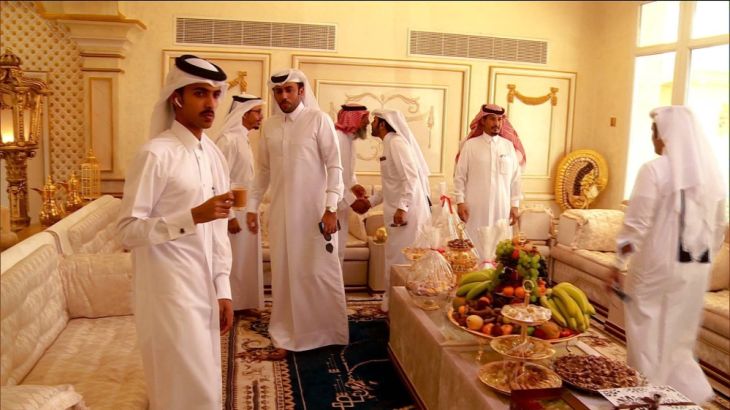‘We are more united’: Qataris mark Eid amid blockade
Qatari citizens express unity, sadness as a regional diplomatic crisis casts shadow over Islam’s most important holiday.

Qataris observed the end of Ramadan on a sombre but resolute note, with a blockade imposed on the country by neighbouring Saudi Arabia and other Arab allies about to enter its fourth week.
On the first day of Eid al-Fitr on Sunday, some citizens of Qatar expressed sadness that they are unable to celebrate Islam’s most important holiday with family members and friends, who are citizens of other countries involved in the dispute.
Keep reading
list of 4 itemsQatar emir condemns ‘genocide’ in Gaza, urges ceasefire at GCC summit
‘Enduring commitment’: Key takeaways from US-GCC joint statement
Analysis: Efforts to end Assad isolation gather speed after quake
On June 5, Saudi Arabia, alongside the United Arab Emirates (UAE), Bahrain and Egypt, triggered a major diplomatic crisis after cutting diplomatic ties with Qatar and cutting off land, air and sea links.
The Al Merri tribe is one of the biggest in the Gulf with family members spread throughout the region, and the crisis is keeping them apart.
READ MORE: Saudi-led blockade on Qatar ‘breaking up families’
“There are a lot of families …, a lot of people who have suffered from this blockade,” Qatari citizen Ali Al Merri told Al Jazeera.
While Gulf leaders continue their political fight, the people suffer, Al Merri added.
“Politicians must keep this between the governments and not involve the citizens.”
Wafaa is a Qatari who divorced her Bahraini husband years ago. Her three children have Bahraini passports and technically have to return to Bahrain, which – alongside Saudi Arabia and the UAE – ordered its citizens to leave Qatar.
Wafaa’s children decided to defy that order – opting to stay in Qatar instead. They are now waiting to hear if they can get Qatari citizenship.
“Our loyalty is to here,” Wafaa told Al Jazeera. “They [the children] have never been to Bahrain. What we know about Bahrain is only the passport. They grew up here, and will continue to be here.”
‘We have become stronger’
Khaled Al Hajiri, another Qatari citizen, said the decision by Saudi Arabia and its allies came as a “shock” to him and his family.
“For me personally, it is breaking my heart that I cannot see my cousins in Abu Dhabi. Most of my friends also have relatives there,” he told Al Jazeera.
“For us, the GCC is not a different country, it is united,” he said, referring to the Gulf Cooperation Council, which numbers Qatar, Saudi Arabia, the UAE, Bahrain, Kuwait and Oman as its members.
“But now politics make it different.”
He said the he is still unsure how and when the dispute will end.
|
|
“This is new to us. We didn’t expect the GCC to have these issues,” he added.
“As a Qatari, I think we have become stronger and more united because of this issue. I hope it will be resolved in a short time.”
But for Abdullah al-Otaibi, a Kuwaiti citizen, the dispute will eventually be resolved “the Arab way”.
He said he came to Qatar to show that “all the Gulf states are one people”.
The emir of Kuwait is mediating between Qatar and the Saudi-Emirati-led bloc to resolve the crisis. But so far, there are no signs of the tensions cooling off.
“We have nothing to be dividing us. We are going to be together, before and after,” Otaibi said.
“This is the government’s issue. They have to do their job. Our job [as citizens] is to be together.”
“Nobody expected this to happen at all. Everybody is thinking that it is representing the people. But Arabs usually solve their problems the Arab way. Fight today, kiss each other the next day.”
How many days is the Eid al-Fitr holiday by country? https://t.co/L4Bsfoa1Kh #EidMubarak pic.twitter.com/HPu13uOZ1t
— Al Jazeera English (@AJEnglish) June 24, 2017